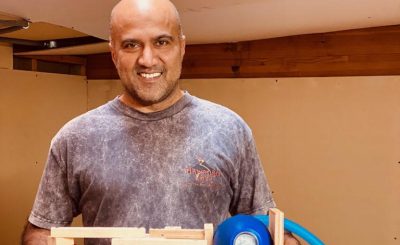Addressing the global ventilator shortage, Kernel Labs founder and chief executive officer Amit Mital ‘87, a leader in disruptive innovation, has created an inexpensive, practical approach that can bring aid to millions around the world.
Through his Seattle technology startup studio, Mital and his team, including three engineering students from Dartmouth and another from the University of Washington, have created AutoLung, a respiratory assistance device for low-income countries. The ventilator can be assembled in two hours at a cost of $200 with simple, locally available hardware. The instructions are easy to follow and require minimal and accessible tools.
“We realized that a core issue was the supply chain – access to parts, ” said Amit. “ We designed the device to use components that already had millions in existence.” The key part of the design is that all the complexity is in the software, which enables the mechanical components to be simple and more easily available.
Kernel does not manufacture these devices. Instead, users can download the free instructions at www.autolung.org to assemble their own. The software can be downloaded on Android phones. So far, the instructions have been downloaded 230 times.
The company came up with the idea in April as the coronavirus spread worldwide and countries experienced a ventilator shortage. They quickly realized that any solution would be too late for the U.S. market, but not for the rest of the world.
“Even if they were available (worldwide), many don’t have the funds for ventilators at $20,000 a piece,” he said. “Most rely on complex manufacturing and parts. In the Central African Republic (a country of 4.6 million), you have seven ventilators for the entire country. We wanted to design a ventilator, that if you have $200 and two hours, you should be able to put one together.”
The first part of the plan is to make the design available for anyone to use. The next step would be to partner with medical groups to evangelize usage.
Autolung ventilator is not approved by the U.S. Food and Drug Administration and is not meant to be a replacement for a mechanical ventilator. It is meant to be used in scenarios where a traditional ventilator is not an option.
An entrepreneur, Amit has served as chief technology officer and EVP at Symantec, and corporate vice president at Microsoft. He has been involved with technology startups as an investor, advisor and board member for many years.

